- God displays His authority with three mysterious signs (Exodus 4:3)
The Shepherd’s Rod Turns Into a Serpent and then is Restored.
A hand is turned leprous and then is Restored.
The Water of the Nile is Turned to Blood.
What do these signs mean?
- The Wrath of God turns on Moses and threatens Him with Death
- Jesus Answers the Big Question: Who is the Greatest in the Kingdom of Heaven?
The Bible is the best commentary on the Bible. As we read of Moses’ first encounter with the God of Abraham, Isaac and Jacob as recorded in the Book of Exodus Chapters 3 and 4, we have the advantage of learning more in the New Testament. Jesus has another dialogue with Moses about the Exodus on the Mount of Transfiguration.
Luke 9:30-31 (NIV) 30 Two men, Moses and Elijah, 31 appeared in glorious splendor, talking with Jesus. They spoke about his departure (Greek word ‘exodus’), which he was about to bring to fulfillment at Jerusalem.
There is a first and second exodus in the Bible. As we read of the first in the Book of Exodus, we can see how it prefigures the second, recorded in the New Testament. As Jesus said, “Moses wrote of me” (John 5:46; Luke 24:44).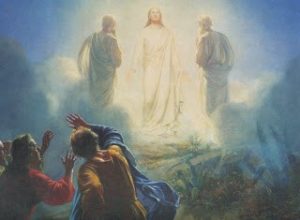
The first exodus is one in which God delivers His chosen people, Israel, from the oppressive rule of Pharaoh who has held them in slavish bondage in a country far from what had been promised to them in the covenant made with Abraham. He does this through the Mediator, Moses.
The second exodus is one in which God delivers those from every people group on the planet from the rule of Satan (2 Cor 4:4; 1 John 5:19; Col 1:13) and their bondage to sin and death. He brings them into the eternal fellowship promised in the new covenant through the one true Mediator between God and man, the man Christ Jesus (1 Timothy 2:5; Hebrews 12:24).
So, what do we learn of the gospel from this introductory dialogue in Exodus 4?
Moses’ attention is grabbed by the manifestation of God’s glory in the ordinary desert bush that is set ablaze, yet not consumed (2 Cor 4:6; Isaiah 53:2; John 3:1-2). When the Lord sees Moses draw near, He makes Himself known. The God of glory who made Himself known to Abraham, Isaac and Jacob is now making Himself known to Moses. He draws him with the light of His glory. He reveals His Name, the Great I AM. He makes His promise to Moses to bring the Israelites out of the affliction of Egypt and deliver His people to the promised land of Canaan (Ex. 3:17). He verbally commissions Moses to go before Pharaoh with His command to let His people go. He also promises that ultimately Moses’ voice will be listened to, although Pharaoh’s heart is hard.
Moses clearly feels inadequate to the task. Although the Lord promised that He Himself would deliver His people and cause Moses’ voice to be heard, Moses makes excuses as to why the mission will fail. He sees himself as a liability to the plan. He feels that he will lack any credibility before his own people much less the Egyptians. How will anyone know that the Lord has truly appeared to him?
“What is that in your hand?” the Lord asks Moses.
“A staff,” Moses replies. It’s an ordinary shepherd’s staff. It is the same Hebrew word that is translated ‘scepter’ in Psalm 110:2; “The LORD will extend your mighty scepter from Zion; you will rule in the midst of your enemies.” It is a symbol of authority, the delegated authority and responsibility to rule over the enemy. The shepherd is appointed to care for, lead, and deliver the flock from its enemies.
The Lord says, “Throw it on the ground”.
Moses obediently complies in submission to the Word of God.
The rod becomes a serpent. Moses runs from it. But the Lord commands Moses to take it by the tail. When he does this the serpent becomes a staff in his hand once again.
The meaning of the first sign has significance for Moses, the Israelites, the Egyptians and for all of us.
First, the sign has significance for Moses. He is to cast down his own right to rule and submit to the rule of God. He is no longer a humanly appointed authority, tending sheep for his father-in-law Jethro. He is appointed by God and God will substantiate that fact with the signs that He gives. The rod will turn to a fearsome serpent. But Moses is not to cower before the serpent but to take the serpent by the tail, assured that God will not allow him to be bitten by the head. 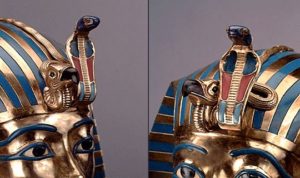
(It is interesting to see how the Egyptian headdress for the Pharaoh has a cobra-like headpiece. The Uraeus was a cobra in upright position worn as a symbol of his authority.) Not only would this encourage Moses that the God of Abraham, Isaac and Jacob had greater authority than Pharaoh, but also greater authority than the gods of Egypt. We are reminded of Jesus’ words:
“I have given you authority to trample on snakes and scorpions and to overcome all the power of the enemy; nothing will harm you” (Luke 10:19).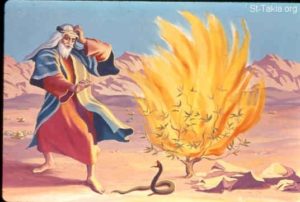
The sign also has significance for the people of Israel. It establishes the fact that the Lord did appear to Moses. Their forefathers had come to Egypt in a highly favored position. The staff, representing the right to rule, had been placed in Joseph’s hands when he was made prime minister of Egypt. God upheld that rule for the salvation of His people from famine. After the death of Joseph, the rule was thrown down and passed into the hands of the Pharaohs of Egypt who would oppress, humiliate, and rule over them. This sign of the serpent being turned back to the rod indicated that the time had now arrived for the reestablishment of the covenant promise of the rule of God in their midst and deliverance from their enemies.
A greater prophetic meaning is seen in the light of what we have already learned as we have been reading the Bible from the beginning. In the Book of Genesis, we see how mankind, created in the image of God, had been given the delegated authority to rule over the earth (Gen 1:26). That rule was thrown down at the fall through mankind’s disobedience to God and faith in the serpent, whom the Bible identifies as the Devil or Satan, (Gen 3:1-14, Revelation 12:9). Jesus said that Satan was a liar and murderer from the beginning (John 8:44).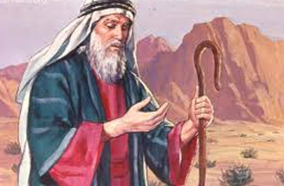
God promises deliverance from the curse through the seed of the woman who would “crush the head” of the serpent (Genesis 3:15). (“Crush the head” is an oriental expression meaning ‘to depose the rule’). Jesus, the Son of God, the second person of the Trinity, lays aside His right to rule and becomes a man, born under the law to fulfill the law on our behalf by His righteous living and His substitutionary dying. On the cross, Jesus, who never sinned, becomes a representation of sin (2 Cor 5:21). He takes the wrath of God against sin upon Himself, becoming a curse on a tree. He becomes the antitype of the brazen serpent that Moses makes to deliver his people from the curse of the snake bites in Numbers 21:6-9.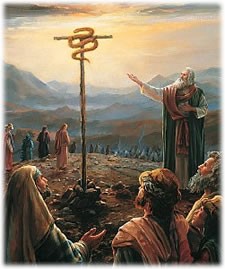
Jesus said, “Just as Moses lifted up the snake in the desert, so the Son of Man must be lifted up, 15 that everyone who believes in him may have eternal life. 16 For God so loved the world that he gave his one and only Son, that whoever believes in him shall not perish but have eternal life” (John 3:14-16).
By faith in Jesus Christ and His finished work of redemption on the cross (illustrated by our taking the serpent by the tail, knowing that the head has been crushed by the Lord Jesus) we are delivered from the world (Egypt) the ruler of the world (Satan- Col 1:13), the hard taskmasters of sin, and our bondage to fear of sin’s penalty – death.
Hebrews 2:14-15 (NIV) 14 Since the children have flesh and blood, he too shared in their humanity so that by his death he might destroy him who holds the power of death–that is, the devil– 15 and free those who all their lives were held in slavery by their fear of death.
The Bible tells us that we are helpless before the god of this world (Pharaoh) and taken captive by him at his will (2 Tim 2:26). Because of sin we are under the sentence of death. Our greater Moses, Jesus, as the Mediator of a new covenant, has released us from the power of sin, death, and fear, thereby overcoming the power of the devil.
The second sign also has great significance. Moses is told to put his hand beneath his cloak and over his heart. When he takes it out, it becomes leprous. When he does this a second time, it emerges restored to its original condition.
Leprosy is a type of sin in the Bible (Leviticus 13:2- 14:57). Sin, like leprosy, is insidious. It starts with what looks like a harmless spot. Then it spreads rapidly and destroys our sensitivity. It kills the members of the body. It is contagious. It separates us from others. It separates us from God and makes us unclean in God’s sight.
In this case, after the hand is put beneath the cloak and over the heart, when Moses withdraws it, his hand becomes leprous. The hand that serves, representing our human instrumentality, will manifest the corruption that is in the heart.
When Moses repeats the action, the leprous hand is restored. We can see how the action performed twice reflects the actions of the first man, Adam, and the second man, Christ; the revelation of sin under the first covenant (the Law) and the revelation of righteousness as a gift under the new covenant (God’s grace).
The first instance of introducing the human hand over the human heart represents the corruption of Adam’s sin. That sin would become manifested in an obvious way as Moses would be the means of bringing this to light through the law.
“Therefore, just as through one man sin entered into the world, and death through sin, and so death spread to all men, because all sinned- for until the Law (represented by Moses) sin was in the world, but sin is not imputed where there is not law. Nevertheless death reigned from Adam until Moses” (Romans 5:12-14a).
Moses is told to repeat the action of placing his hand over his heart. This speaks of the healing and cleansing that God will bring through the gift of righteousness offered by the second man in the new covenant.
“…much more did the grace of God and the gift by the grace of the one Man, Jesus Christ, abound to the many. (Romans 5:15b)
The Book of Exodus is about deliverance. It is about the work of redemption. Redemption would come through Christ Jesus, the Rod of God (Ps. 110:2) becoming a sinless substitute identifying with the corruption brought in through the serpent. He is taken up again, not only to restore us to the rule of God, but to cleanse us.
Grace, grace, God’s grace
Grace that will pardon and cleanse within
Grace, grace, God’s grace
Grace that is greater than all my sin!
What God would do through Moses in Egypt would test and reveal what is in the heart.
The third sign was that of water from the Nile being poured out on the ground and turning to blood. This would be a sign of the judgment that was to come. The Nile was Egypt’s life. It brought the blessing of refreshment and fruitfulness to the land. Egypt’s health depended on the health of the Nile. But that ‘life-giving blessing’ would be turned into a scourge of death if His Word was not heeded.
Even after these signs are given, do you notice how Moses continues with his excuse making? Do we do the same? Let us be careful to recognize the fact that God made the mouth. He made you. He would not call you to do something if He were not committed to doing it through you.
1 Thessalonians 5:24 (NIV) 24 The one who calls you is faithful and he will do it.
What about the incident where the Lord wants to kill Moses for not circumcising his son?
This incident reminds us that God is holy. He was calling Moses to fulfill the covenant promise given to Abraham by bringing His descendants into the promised land. Yet the very sign of that covenant God made with Abraham and his descendants was circumcision (Genesis 17:10-14) and Moses had neglected his responsibility to implement that rite in his own family. This was to be a sign of identification with the promise, and to neglect this would mean being cut off from the blessings.
Although the promise has come in Abraham’s descendent, Jesus Christ, and the rite of circumcision is not a New Testament obligation, this incident is an important reminder that, as those appointed to lead others, we need to practice what we preach.
Moses learned that God is to be feared more than Pharaoh and we are not to excuse ourselves from obedience to His Word.
The fear of the Lord is the beginning of wisdom. Like Moses, we can dodge obedience with excuses like, “Why me”, or “I can’t”, or when God gives a command, we think it is a small matter. Our hearts are corrupt, our hands leprous. We need the Lord’s cleansing and forgiveness. Only He can make us whole.
NEW TESTAMENT READING: MATTHEW 18:1-20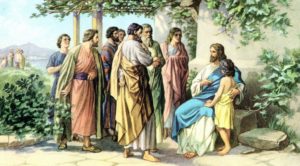
In Matthew 18 we see the importance of humility and the horror of sin. We also see the danger of causing others to sin.
When asked, “Who is the greatest in the kingdom of heaven?”, the disciples are wondering which one of them would be honored. Imagine their surprise when Jesus passes by them and calls a child to stand among them!
“Before honor comes humility” (Prov 15:33; 18:12). And for the human heart to be humble requires conversion.
Matthew 18:3 (NIV) 3 And he said: “I tell you the truth, unless you change and become like little children, you will never enter the kingdom of heaven.
The Lord Jesus then speaks about the severe danger of causing others to stumble or be led astray by our words or behavior that serve as poor examples.
Jesus also speaks of the need to remove from our lives that which makes us stumble or could cause others to stumble. Earlier in the Sermon on the Mount, Jesus used the example:
Matthew 5:29-30 29 “If your right eye makes you stumble, tear it out and throw it from you; for it is better for you to lose one of the parts of your body, than for your whole body to be thrown into hell. 30 “If your right hand makes you stumble, cut it off and throw it from you; for it is better for you to lose one of the parts of your body, than for your whole body to go into hell.
Now He says:
Matthew 18:8-9 8 “If your hand or your foot causes you to stumble, cut it off and throw it from you; it is better for you to enter life crippled or lame, than to have two hands or two feet and be cast into the eternal fire. 9 “If your eye causes you to stumble, pluck it out and throw it from you. It is better for you to enter life with one eye, than to have two eyes and be cast into the fiery hell.
Jesus warns those who would follow Him of the dangers of hell. We need to be aware of God’s provisions for the judgment of sin. There are only two provisions for the judgment of sin in the Bible: Jesus’ substitutionary sacrifice and hell.
The fires of hell do not ultimately satisfy the justice of God. This is why hell’s fire is eternal. If God’s justice could be satisfied with the punishment of hellfire, it would not last forever. Only the shed blood of Jesus truly satisfies God’s justice.
If we truly realize the adequacy of God’s gracious provision in which He punished our sin two thousand years ago when His holy Son Jesus bore the full wrath of God against sin for us on the cross, we will want to walk humbly before the Lord and remove all cause for stumbling in our lives, and anything that might make people turn away from the provision found in the person and work of our Savior.
TODAY’S READING FROM THE BOOK OF PSALMS- PSALM 22:19-31 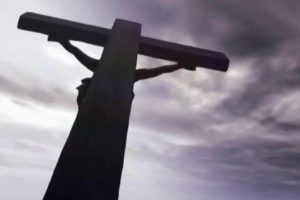
Psalm 22 is the first in a trilogy of psalms that describe the Shepherd-King, prophetically pointing to the ministry of Christ. Psalm 22 describes the Shepherd as He lays down His life, suffering death for the flock (John 10:1-18). Psalm 23 describes the Shepherd King as He lives and cares for the flock (Hebrews 13:20-21). Psalm 24 describes the Shepherd King returning to reward His flock for their service (1 Peter 5:4).
The prayers that seemed to go unanswered as the Psalmist complained in verse 1 of God’s abandonment, are triumphantly answered in verse 21 and following.
Psalm 22:21b-22 You have rescued me from the horns of the wild oxen! 22 I will tell of your name to my brothers; in the midst of the congregation I will praise you:
Death could not hold God’s suffering servant. In these closing verses of Psalm 22 we see a prophetic picture of the Good Shepherd, standing fully vindicated among His adopted brethren in His resurrection glory.
There is no Biblical evidence that Jesus stood before unbelievers in the days immediately following His resurrection.
Psalm 22:22 22 I will tell of your name to my brothers; in the midst of the congregation I will praise you.:
The writer of Hebrews quotes verse 22 from this chapter when describing what Jesus accomplished in His sufferings. He tasted our death for us, that we might be justified, sanctified and glorified and live with Him.
Hebrews 2:9 9 But we see him who for a little while was made lower than the angels, namely Jesus, crowned with glory and honor because of the suffering of death, so that by the grace of God he might taste death for everyone.
Jesus endured the cross for the joy that was set before Him. He had the pleasure of bringing many sons (and daughters) to glory.
Hebrews 2:10 10 For it was fitting that he, for whom and by whom all things exist, in bringing many sons to glory, should make the founder of their salvation perfect through suffering.
Hebrews 2:11-12 11 For he who sanctifies and those who are sanctified all have one source. That is why he is not ashamed to call them brothers, 12 saying, “I will tell of your name to my brothers; in the midst of the congregation I will sing your praise.”
The prayers of the seemingly God-forsaken are answered in Christ.
Psalm 22:23-24 23 You who fear the LORD, praise him! All your offspring of Jacob, glorify him, and stand in awe of him, all you offspring of Israel! 24 For he has not despised or abhorred the affliction of the afflicted, and he has not hidden his face from him, but has heard, when he cried to him.
The global implications of the sufferings of Christ and the glories that follow are prefigured in these verses.
1 Peter 1:10-11 10 Concerning this salvation, the prophets who prophesied about the grace that was to be yours searched and inquired carefully, 11 inquiring what person or time the Spirit of Christ in them was indicating when he predicted the sufferings of Christ and the subsequent glories.
Psalm 22:27-28 27 All the ends of the earth shall remember and turn to the LORD, and all the families of the nations shall worship before you. 28 For kingship belongs to the LORD, and he rules over the nations.
TODAY’S READING FROM THE BOOK OF PROVERBS- PROVERBS 5:15-21
This proverb highlights the reward of pursuing personal purity and the gift of sexuality within the God-given covenant of marriage. God wants all His gifts used in a way that honors His plan and His design.
Proverbs 5:15-21 15 Drink water from your own cistern and fresh water from your own well. 16 Should your springs be dispersed abroad, streams of water in the streets? 17 Let them be yours alone and not for strangers with you. 18 Let your fountain be blessed, and rejoice in the wife of your youth. 19 As a loving hind and a graceful doe, let her breasts satisfy you at all times; Be exhilarated always with her love. 20 For why should you, my son, be exhilarated with an adulteress and embrace the bosom of a foreigner? 21 For the ways of a man are before the eyes of the LORD, and He watches all his paths.
PRAYER: Forgive us, Lord, for making excuses when You call us to action. You are faithful to provide all the resources to enable us to fulfill Your will. You have given us the victory of Christ, the gift of the Holy Spirit, power for witness, and the privilege of prayer. May we not neglect these. Help us to pursue personal purity, and whole-hearted obedience. Yours is the blessed life of full availability and obedience. You have given this life to us freely through the merits of Your Son. May we lay hold of this eternal life today in Jesus’ Name.
PASTOR DAVID
So, naturally, we proclaim Christ! We warn everyone we meet, and we teach everyone we can, all that we know about him, so that, if possible, we may bring every man up to his full maturity in Christ. (Colossians 1:28, J.B. Phillips paraphrase)
New Life Community Church, Concord, MA 10742
www.newlife.org
Meeting Sundays at 10:30 AM at the New Life Ministry Center, 221 Baker Avenue, Concord, MA 01742
New Life Fine Arts
“Theater you can believe in.”
www.newlifefinearts.org
